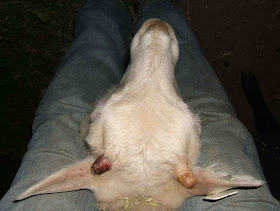

Bodhran and Blake are still basically smooth-polled at three months of age. If you look closely (click to biggify), you can see tiny points of horn material on Blake's head only because they are a different color than his fleece. But if you palpate Bodhran's and Banjo's heads, they have the same size points as Blake (Banjo, of course, is wethered).


Barry was born with big horn buds, but knocked off both his horn sheaths earlier (and knocked the left one off again on the way home from BSG). He is wethered, so his horn growth should be very slow now.

How does your horn-garden grow?

How does one judge, at this stage, if the horn growth is good or bad? I don't really know anything about the subject. Is there a way to predict or guess how the horn will look later on?
ReplyDeleteChristine, one can predict, and the more experience one has the better one CAN predict, but the horned-ram breeders I respect most say you really cannot call it until the horns start to make that first turn. (See an excellent article on horn growth here: http://stonehavenfarm.com/blog/?p=91) That is part of the reason I "went polled;" to avoid that heartbreaking "turn" of events when an otherwise wonderful ram's horns turn out to be "fatal." Since then, I've learned that there may be a genetic link between polled genetics and fine-fleece genetics; a plus for me!
ReplyDeleteWonderful smooth polled boys! Thank you for posting the ages too. It helps me learn about what I'm seeing in my flock.
ReplyDeleteYeah, it isn't much help to see photos when you don't know the ram lambs' ages! You're welcome. :-)
ReplyDeleteWell, no horns here, but wonderful pictures and I'm sure it is extremely helpful to those with their own little rammies!
ReplyDeleteInteresting article. Thanks for the link!
I love horns!! One of the 'minor' reasons I am getting Icelandics. My set of twin shetland ram lambs took forever to start growning in their horns.
ReplyDeleteYour boys all look SOOOO good!
Michelle - sorry, I am clueless, but would you not want to disbud them? Or do you want to see how the buds/horns are growing so that you can make the genetic choices for polled? And it is favorable to have rams with horns for shows? I know, I'm full of questions tonight! LOL Take care, from KY.
ReplyDeleteHi Kathy, my understanding is that sheep cannot be disbudded like goats; physically it doesn't work. Plus, in Shetlands, you wouldn't want to perpetrate "fatal" horn growth (horns that grow into an animal's head or neck), and if you COULD disbud a ram lamb you wouldn't know what kind of horn growth he would pass on to his offspring. The genetics for polled rams, horned rams, hornless ewes, horned ewes and even four-horned rams are in the Shetland gene pool so they are all supposed to be equally acceptable, but if you have a judge who doesn't know this (and we have very few "Shetland" judges in this country), then s/he might be biased against polled rams. And yes, I myself want to be able to make choices based on who carries the poll gene in my flock, so I am interested in seeing what develops (or not) on their heads! Hope that helps. :-)
ReplyDeleteReally interesting, thank you. I have only 3 Shetlands (amongst other breeds such as Valais Blacknose & Wiltshire Horns), a ewe and her twin lambs one of which is a wether. At 6 months old his horns are only about the same length as the ram in the first photo and I hadn't realised this was because wethers have slower horn growth (makes sense, I suppose I just thought that horn growth was independent of Testosterone since many female breeds of sheep are horned....). Do you know if wethers eventually grow horns exactly the same as full males, just slower....?
ReplyDeleteMany thanks, Abby
Hi Abby, and welcome! Curious as to how you found this old post
ReplyDeleteMy limited experience says wethers will never grow the same amount of horn material as rams if they are castrated in the first few weeks or months. I do know of people who have castrated mature rams for one reason or another; they, of course, will keep their full "rack."